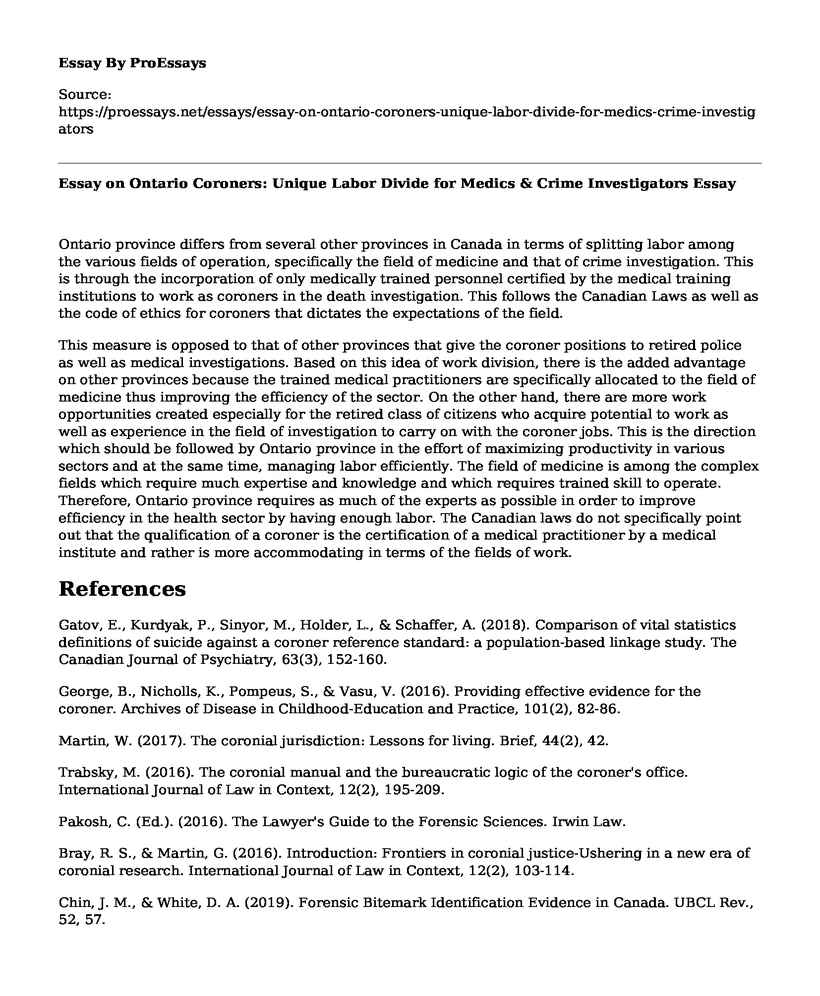Ontario province differs from several other provinces in Canada in terms of splitting labor among the various fields of operation, specifically the field of medicine and that of crime investigation. This is through the incorporation of only medically trained personnel certified by the medical training institutions to work as coroners in the death investigation. This follows the Canadian Laws as well as the code of ethics for coroners that dictates the expectations of the field.
This measure is opposed to that of other provinces that give the coroner positions to retired police as well as medical investigations. Based on this idea of work division, there is the added advantage on other provinces because the trained medical practitioners are specifically allocated to the field of medicine thus improving the efficiency of the sector. On the other hand, there are more work opportunities created especially for the retired class of citizens who acquire potential to work as well as experience in the field of investigation to carry on with the coroner jobs. This is the direction which should be followed by Ontario province in the effort of maximizing productivity in various sectors and at the same time, managing labor efficiently. The field of medicine is among the complex fields which require much expertise and knowledge and which requires trained skill to operate. Therefore, Ontario province requires as much of the experts as possible in order to improve efficiency in the health sector by having enough labor. The Canadian laws do not specifically point out that the qualification of a coroner is the certification of a medical practitioner by a medical institute and rather is more accommodating in terms of the fields of work.
References
Gatov, E., Kurdyak, P., Sinyor, M., Holder, L., & Schaffer, A. (2018). Comparison of vital statistics definitions of suicide against a coroner reference standard: a population-based linkage study. The Canadian Journal of Psychiatry, 63(3), 152-160.
George, B., Nicholls, K., Pompeus, S., & Vasu, V. (2016). Providing effective evidence for the coroner. Archives of Disease in Childhood-Education and Practice, 101(2), 82-86.
Martin, W. (2017). The coronial jurisdiction: Lessons for living. Brief, 44(2), 42.
Trabsky, M. (2016). The coronial manual and the bureaucratic logic of the coroner's office. International Journal of Law in Context, 12(2), 195-209.
Pakosh, C. (Ed.). (2016). The Lawyer's Guide to the Forensic Sciences. Irwin Law.
Bray, R. S., & Martin, G. (2016). Introduction: Frontiers in coronial justice-Ushering in a new era of coronial research. International Journal of Law in Context, 12(2), 103-114.
Chin, J. M., & White, D. A. (2019). Forensic Bitemark Identification Evidence in Canada. UBCL Rev., 52, 57.
Kelsall, D., & Bowes, M. J. (2016). No standards: medicolegal investigation of deaths.
Skinner, M., & Bowie, K. (2016). Forensic anthropology: Canadian content and contributions. In Handbook of forensic anthropology and archaeology (pp. 149-167). Routledge.
Cite this page
Essay on Ontario Coroners: Unique Labor Divide for Medics & Crime Investigators. (2023, Jan 29). Retrieved from https://proessays.net/essays/essay-on-ontario-coroners-unique-labor-divide-for-medics-crime-investigators
If you are the original author of this essay and no longer wish to have it published on the ProEssays website, please click below to request its removal:
- Duties of Correction Officer
- Mediation as a Tool for Conflict Management Paper Example
- Essay Sample on U.S. Criminal Justice System: A Vast, Complicated Structure
- Essay Example on Exploring Houses of Faith in Portland Area
- Criminal Justice Systems: Examining the Flaws and Debates - Essay Sample
- Essay Example on The Hero in Me: My Journey to Becoming a Nurse
- The Founding Documents: The Interplay of the Declaration of Independence and the United States Constitution







